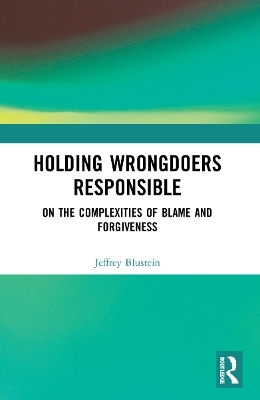
Holding Wrongdoers Responsible
Routledge (Verlag)
978-1-032-13947-0 (ISBN)
Holding Wrongdoers Responsible contests a number of widely accepted claims about blame and forgiveness that are insufficiently examined in the philosophical literature, and their relationship to each other. These claims are:
i Anger is the most fitting kind of blame for those who are guilty of wrongdoing.
ii Culpable wrongdoers should be blamed for what they have done.
iii Forgiving consists of renouncing blame and blame feelings, especially angry ones.
iv Forgiving is a kind and compassionate act for which a wrongdoer should be grateful.
Against (i), the book argues that there are a number of reasons why we should be skeptical about the singular importance given to anger in this connection; against (ii), that blame is just one possible response to wrongdoing and, like other responses, has to be evaluated in relation to its purposes and the available alternatives; against (iii), that the continuation of blame after forgiveness is neither conceptually nor morally ruled out; and against (iv), that the image of forgiveness as benevolent and gift-like belies its dark side. By contesting these claims, the book reveals some of the moral and psychological complexities of these phenomena.
Jeffrey M. Blustein is Professor of Philosophy and Arthur Zitrin Professor of Bioethics, City College, City University of New York. His previously authored books include The Moral Demands of Memory (2008) and Forgiveness and Remembrance: Remembering Wrongdoing in Personal and Public Life (2014).
Introduction: On the Complexities of Blame and Forgiveness 1. The Problem with Blame 2. The Hostility Critique 3. Varieties of Blame 4. To Blame or Not to Blame? 5. An Ethics of Blame 6. Forgoing Blame 7. Holding Responsible Without Blame Part I Conclusion: Taking Stock 8. Blame Before and After Forgiveness 9. Is Blame Renounced by Forgiveness? Some Philosophical Accounts 10. Forgiveness and the Purposes of Blame 11. How Forgiveness Changes Blame Part II Conclusion: Withdrawing Good Will and Expressing Ill Will Appendix I: On the Moral Peril of Forgiveness in Eugene O’Neill’s The Iceman Cometh 12. Praising and Debunking Forgiveness 13. The Electivity of Forgiveness 14. The Gratitude-Based Objection 15. Aristotle, Kant and the Problem with Gratitude 16. Nietzsche, Nussbaum and the Problem with Forgiveness 17. An Alternative Moral Psychology of Gratitude and Forgiveness Part III Conclusion: The Two Faces of Forgiveness Appendix II: On Blame and Optimism
| Erscheinungsdatum | 17.07.2023 |
|---|---|
| Verlagsort | London |
| Sprache | englisch |
| Maße | 152 x 229 mm |
| Gewicht | 453 g |
| Themenwelt | Geisteswissenschaften ► Philosophie ► Ethik |
| Geisteswissenschaften ► Psychologie ► Sozialpsychologie | |
| ISBN-10 | 1-032-13947-1 / 1032139471 |
| ISBN-13 | 978-1-032-13947-0 / 9781032139470 |
| Zustand | Neuware |
| Haben Sie eine Frage zum Produkt? |
aus dem Bereich


